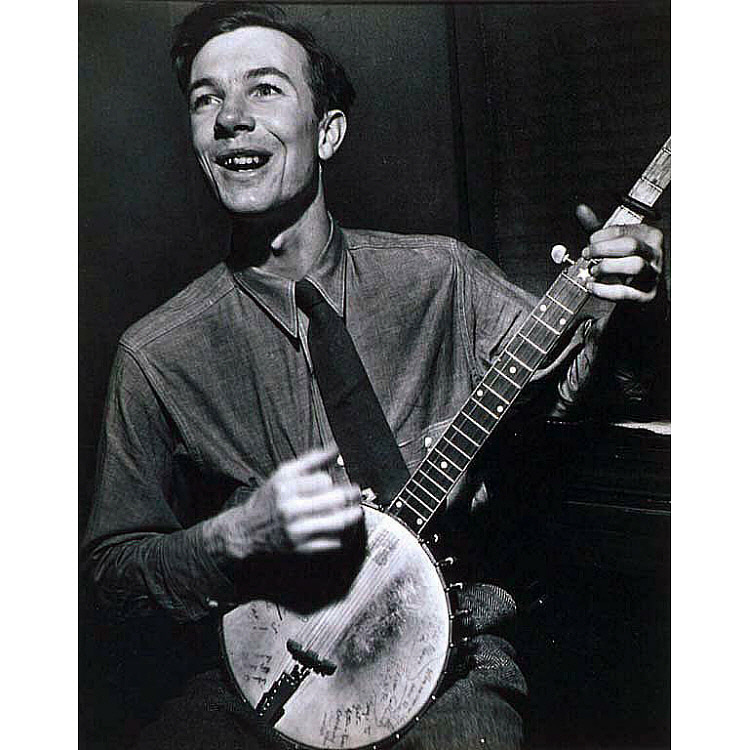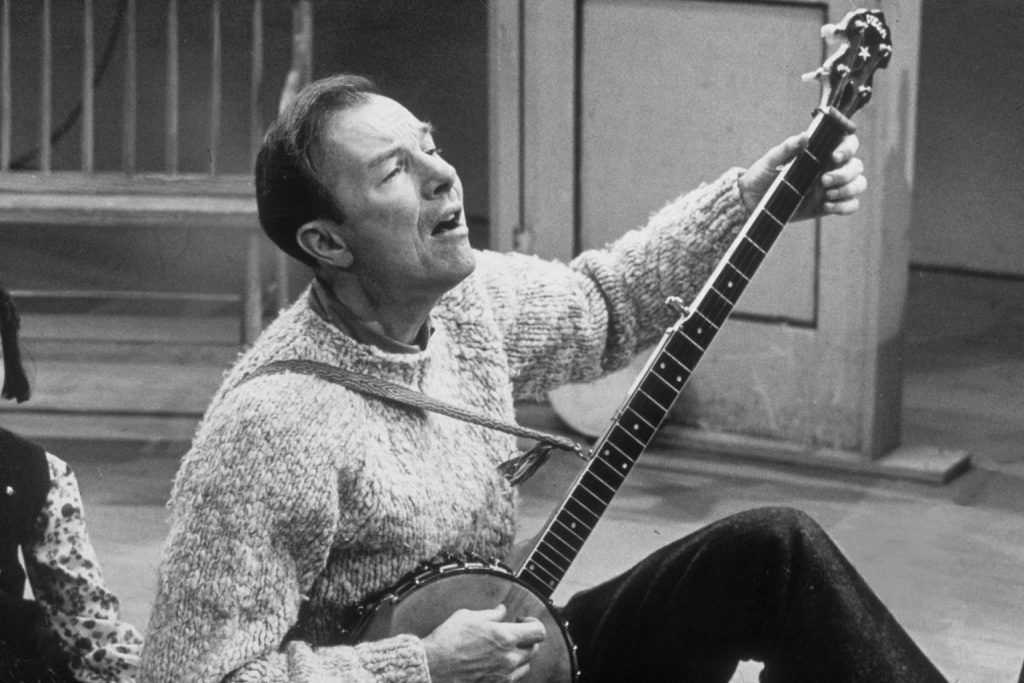This is the 9th article in our continuing series about the Folk Americana Roots Hall of Fame’s (FARHOF) inaugural class of inductees. The first induction ceremonies will take place in April although an exact date has not yet been announced. This article is about Solo Legacy inductee, Pete Seeger. A solo legacy artist is a performer whose initial impact on the genre was at least 45 years prior to the year of Induction.
If you were to do a search for “the quintessential folk singer” Seeger is bound to be among the names of those whose names come up. You will find Woody Guthrie mentioned along with Bob Dylan, Lead Belly, Joni Mitchel, Gordon Lightfoot, Joan Baez, Arlo Guthrie, and Townes Van Zandt. There are many other names that will show up as well, including some more contemporary artists such as Mumford and Sons and Jason Isbell.
It is doubtful anyone has done more to advance American folk music than Seeger. None have promoted the genre longer either. His work has inspired several of the artists named above and both promoted and popularized the works of the others. He was at the forefront of not one but two folk revivals. His activities and influence went far beyond the folk music he popularized.
“My job,” he said in 2009, “is to show folks there’s a lot of good music in this world, and if used right it may help to save the planet.” The causes he supported often could be found in the music he popularized.
“We Shall Overcome” became an anthem for the Civil Rights movement of the 1960s.
“Talking Union,” as the title implies, addressed the struggles of and need for unionization of workers.
Woody Guthrie’s “This Land Is Your Land,” sung with pride by Seeger and the Weavers, boasted not only the beauty and bounty of America but was a reminder of the nation’s promise of equality for all.
On the subject of war, he wrote “Where Have All The Flowers Gone” which emphasized the human cost of waging war. “Waist Deep In The Big Muddy,” with its repeated line “The big fool says to push on,” protested war seemingly for war’s sake.
Seeger wasn’t necessarily anti-war, though. He recognized in song that there are times it may be necessary. In the WWII song “Dear Mr. President” he proclaimed, “I’m fightin’ because I want a better America.” Adolf Hitler must be defeated because he posed a threat to our way of life.
Pete Seeger was born on May 3, 1919, in New York City. You might say music and the arts were in his blood. His father, Charles, was a musicologist and composer. His mother, Constance de Clyver Seeger (née Edson), was a concert violinist and later a teacher at the Juilliard School.
His uncle, Alan Seeger, was a promising young poet who died in action in World War I on July 4, 1916, while fighting for the French Foreign Legion. A collection of his poems was published in December of that year. One of those poems, “I Have A Rendezvous With Death” became his most famous and was said to be a favorite of President John F. Kennedy.

Pete Seeger fell in love with the five-string banjo after hearing it at the Mountain Dance and Folk Festival in western North Carolina near Asheville. He spent the next four years trying to master it.
He enrolled at Harvard in 1936 on a partial scholarship. The 19 year-old Seeger, whose classmates included John F. Kennedy and the poet Robert Lowell, found himself at odds with his professors. He joined the Young Communist League, finding its stance as champion of the underdog to be appealing. After two years at Harvard, he dropped out with aspirations to become a journalist in New York City.
In the fall of 1938 Seeger began to work for Alan Lomax at the Archive of American Folk Song in Washington, D.C. His job was to find recordings that best represented American folk music. Lomax also encouraged Seeger’s folk music pursuits. Seeger soon was appearing on the radio show Back Where I Come From where he played alongside Josh White, Woody Guthrie, Burl Ives, and Lead Belly.
Seeger became a member of the Almanac Singers in 1941, performing with Millard Lampell, Cisco Houston, Woody Guthrie, Butch Hawes and Bess Lomax Hawes, and Lee Hays. He and Hays would later form the Weavers, a group he performed with until 1958. While with the Weavers he helped popularize such songs as “On Top Of Old Smokey,” “Goodnight, Irene,” “So Long, It’s Been Good To Know You,” “The Hammer Song (If I Had A Hammer),” and “Kisses Sweeter Than Wine.”
As noted in our article on the Weavers, Seeger came under fire from Joseph McCarthy and his House Un-American Activities Committee hearings. He was subpoenaed to testify and made the following statement:
I feel that in my whole life I have never done anything of any conspiratorial nature and I resent very much and very deeply the implication of being called before this committee that in some way because my opinions may be different from yours… that I am any less of an American than anybody else. I love my country very deeply, sir.
Seeger, along with many others, was cited for contempt of Congress. He was later tried and convicted but the conviction was later overturned on technical grounds. He remained blacklisted for years but never compromised his conviction and belief that he had done anything to be ashamed of and certainly nothing to ask forgiveness for.
As part of the Weavers, Seeger had helped bring about the folk revival of the 1950s. He inspired many who contributed to its revival in the 1960s. The Kingston Trio had a hit with “Where Have All The Flowers Gone” and similarly Peter, Paul, and Mary had one with “The Hammer Song.”
Seeger also became friends with Bob Dylan and a mentor to him. Many people will recall when Bob Dylan came onstage at the Newport Folk Festival in 1965 with an electric guitar and Seeger famously became so angry that he tried to cut the cables with an axe. Seeger says they recall things incorrectly. He was not upset about Dylan going electric.
I couldn’t understand the words. I wanted to hear the words. It was a great song, “Maggie’s Farm,” and the sound was distorted. I ran over to the guy at the controls and shouted, “Fix the sound so you can hear the words.” He hollered back, “This is the way they want it.” I said “Damn it, if I had an axe, I’d cut the cable right now.”
He began touring extensively with Arlo Guthrie in the 1970s and 1980s. And in the 1990s he began to receive awards and tributes celebrating his long career. If America had turned its back on Seeger during the McCarthy era, it apologized and showed its appreciation for his music starting in the Clinton years. His induction into the Folk Americana Roots Hall of Fame is just the most recent honor.
Pete Seeger continued to perform right up until he died on January 27, 2014 at the age of 94. His voice was no longer strong and vibrant as it once was but he encouraged his audiences to sing along with him. As he said before performing “The Hammer Song” at Farm Aid in 2013, “If you sing it, well… We’ll make a good sound.” The audience joined in enthusiastically.
Nothing would please Pete Seeger more than if we all continued to make a good sound.
Next up – Jean Ritchie


